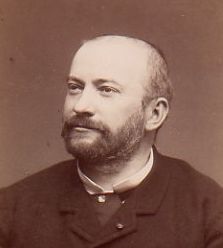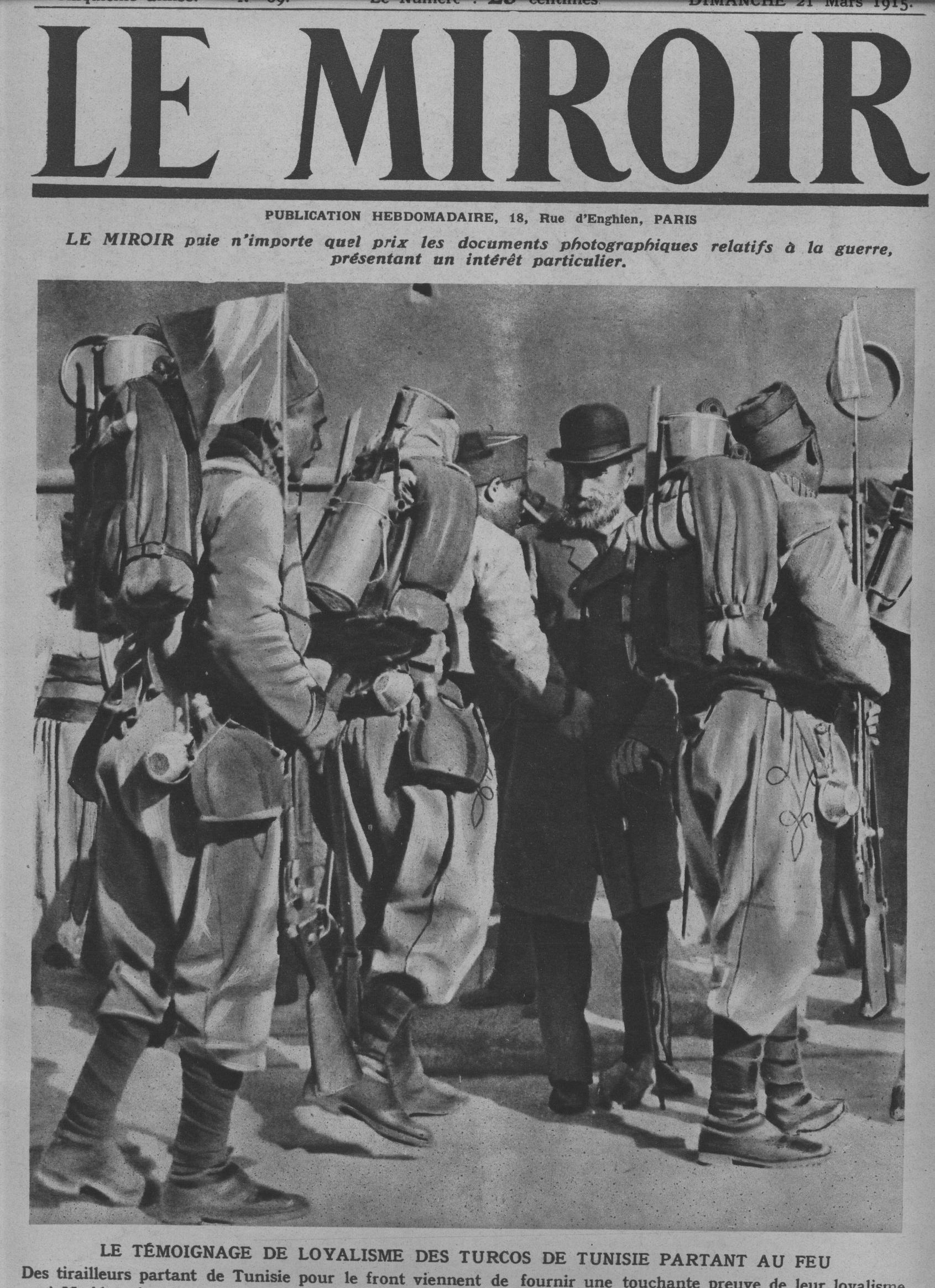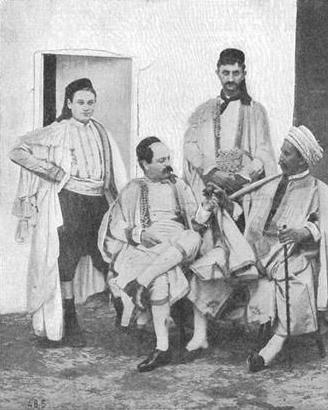|
Tunisian Consultative Conference
The Tunisian Consultative Conference was an organ of government set up under the French Protectorate of Tunisia. Presided over by the French Resident-General or his representative, its remit was originally very narrow: it was not allowed to discuss political or constitutional matters, or public finances and accounts. At the same time it was accountable for “obligatory” spending, which included the civil list of the Bey and subsidies paid to the ruling Husainid dynasty, as well as the servicing of Tunisia's public debt and the management costs of French services in the protectorate (decree of 2 February 1907). The steady evolution of this institution over time was a measure of the development of nationalist ideas. A generation of Tunisian politicians, including Abdeljelil Zaouche, Tahar Ben Ammar and Mohamed Chenik, made their entry into public life through the conference, and eventually negotiated the terms of Tunisian independence. Early period (1891-1907) From 1688, the ... [...More Info...] [...Related Items...] OR: [Wikipedia] [Google] [Baidu] |
French Protectorate Of Tunisia
The French protectorate of Tunisia (french: Protectorat français de Tunisie; ar, الحماية الفرنسية في تونس '), commonly referred to as simply French Tunisia, was established in 1881, during the French colonial Empire era, and lasted until Tunisian independence in 1956. The protectorate was established by the Bardo Treaty of 12 May 1881 after a military conquest, despite Italian disapproval. It was part of French North Africa with French Algeria and the Protectorate of Morocco, and more broadly of the French Empire. Tunisian sovereignty was more reduced in 1883, the Bey was only signing the decrees and laws prepared by the Resident General of France in Tunisia. The Tunisian government at the local level remained in place, and was only coordinating between Tunisians and the administrations set up on the model of what existed in France. The Tunisian government's budget was quickly cleaned up, which made it possible to launch multiple infrastructure constr ... [...More Info...] [...Related Items...] OR: [Wikipedia] [Google] [Baidu] |
Le Kef
El Kef ( ar, الكاف '), also known as ''Le Kef'', is a city in northwestern Tunisia. It serves as the capital of the Kef Governorate. El Kef is situated to the west of Tunis and some east of the border between Algeria and Tunisia. It has a population of (2004 census). The old town is built on the cliff face of the table-top Jebel Dyr mountain. El Kef was the provisional capital of Tunisia during World War II. It was the command centre of the Front de Libération Nationale during the Algerian War of Independence against the French in the 1950s. The Sidi Bou Makhlouf Mausoleum entombs the patron saint of the city. Geography The highest-elevated city of Tunisia, at , its metropolitan area reaches of which lie within the interior of the old walled Medina quarter. The municipality of El Kef is shared between two national delegates, East Kef and West Kef, which correspond to the two municipal boroughs. History Etymology First known by the name of Sicca during ... [...More Info...] [...Related Items...] OR: [Wikipedia] [Google] [Baidu] |
Gabriel Alapetite
Gabriel Ferdinand Alapetite (5 January 1854 – 22 March 1932) was a French senior civil servant and diplomat. From 1879 to 1906 he was sub-prefect or prefect of various departments of France. For eleven years from 1906 to 1918 he was Resident-General of France in Tunisia, where he initiated various administrative improvements. He considered that the Tunisian Muslims had an utterly different mentality from French people, and could never become citizens of France. He was violently antisemitic, and opposed recruiting Tunisian Jews during World War I (1914–18). After the war he was briefly French Ambassador in Madrid, then for four years administered Alsace-Lorraine, which had been returned from Germany to France. Early years Gabriel Alapetite was born on 5 January 1854 in Clamecy, Nièvre. He came from an old republican family. His parents were Marien Ferdinand Alapetite (1821–95) and Alphonsine Janiska (1832–91). His siblings were Jeanne Marie Alapetite (1852–1918) and Em ... [...More Info...] [...Related Items...] OR: [Wikipedia] [Google] [Baidu] |
Mejba Revolt
The Mejba Revolt (1864–65) was a rebellion in Tunisia against the doubling of an unpopular poll tax (the ''mejba'') imposed on his subjects by Sadok Bey. The most extensive revolt against the rule of the Husainid Beys of Tunis, it saw uprisings all over the country and came close to prompting military intervention by Britain and France. The revolt was suppressed with great brutality and the government became ever more seriously indebted to foreign creditors, backed by European governments, until it was finally unable to resist French occupation in 1881. Background Public debt did not exist in the Regency of Tunis until the end of the reign of Mustapha Bey in 1837, but his successors found themselves in increasingly difficult financial circumstances. They wanted to modernise the country and its institutions: Ahmed Bey had set up a military academy at Le Bardo and begun training a larger army. He sent 15,000 Tunisian soldiers to fight for the Ottoman Empire in the Crimean ... [...More Info...] [...Related Items...] OR: [Wikipedia] [Google] [Baidu] |
Caïd
Qaid ( ar , قائد ', "commander"; pl. '), also spelled kaid or caïd, is a word meaning "commander" or "leader." It was a title in the Norman kingdom of Sicily, applied to palatine officials and members of the ''curia'', usually to those who were Muslims or converts to Islam. The word entered the Latin language as lat, gaitus or lat, gaytus. Later the word was used in North Africa for the governor of a fortress or the warden of a prison, also in Spain and Portugal in the form with the definite article "alcayde" (Spanish) "alcaide" (Portuguese). It is also used as a male Arabic given name. Notable qaids * Al Qaid Johar (active 950–992), A Slavic general who conquered Maghreb for the Fatimid Imam-Caliph, Al-Mu'izz li-Din Allah; and later served as the Viceroy of the Fatimid State. *Thomas Brun (active 1137–1154), Englishman who served Roger II of Sicily *Ahmed es-Sikeli, known as Caid Peter (active 1160s), eunuch in the court of Sicily, confidant of Margaret of Na ... [...More Info...] [...Related Items...] OR: [Wikipedia] [Google] [Baidu] |
Ali Bach Hamba
Ali Bach Hamba (1876 - 29 October 1918) was a Tunisian lawyer, journalist and politician. He co-founded the Young Tunisians with Béchir Sfar in 1907. Biography Bach Hamba was born in 1876 in Tunis into a family of Turkish origin, his brother, Mohamed Bach Hamba, was the editor of "''Revue du Maghreb''".. He studied at the Sadiki College prior to achieving a master's and then a doctorate in law at the Aix-Marseille University. In 1907 he and Béchir Sfar created a political group, the Young Tunisians (influenced by the Young Turks), with a French language weekly, "'' Le Tunisien''", to speak for the interests of their countrymen.. They sought for equality and demanded for rights in accordance with the terms of the protectorate. In 1909 they were joined by Abdelaziz Thâalbi, and the movement acquired a religious as well as a constitutional character, with an Arabic as well as a French edition of "''Le Tunisien''". The popularity of the new party was demonstrated in 1911, when ... [...More Info...] [...Related Items...] OR: [Wikipedia] [Google] [Baidu] |
Young Tunisians
The Young Tunisians ( ar, حركة الشباب التونسى ') (french: Jeunes Tunisiens) was a Tunisian political party and political reform movement in the early 20th century. Its main goal was to advocate for reforms in the French protectorate in order to give more political autonomy and equal treatment to Tunisians. History and profile In 1883, Tunisia was declared a protectorate. A group of young Tunisian intellectuals started an anti-colonial movement that was challenging the Sufi orders. Their ideas influenced the modern reforms in the country. The party, known as the Jeunes Tunisiens (Young Tunisians), was formed in 1907 who thought that the people of Tunisia should have self-determination, rather than being a protectorate of France. The movement was inspired by the Young Turks of the Ottoman Empire and the Egyptian National Party led by Mustafa Kamil Pasha. They were French-educated and advocated for the rights of Tunisians and Frenchmen. In 1908 the party suppor ... [...More Info...] [...Related Items...] OR: [Wikipedia] [Google] [Baidu] |
Djerba
Djerba (; ar, جربة, Jirba, ; it, Meninge, Girba), also transliterated as Jerba or Jarbah, is a Tunisian island and the largest island of North Africa at , in the Gulf of Gabès, off the coast of Tunisia. It had a population of 139,544 at the 2004 census, which rose to 163,726 at the 2014 census. Citing the long and unique history of its Jewish minority in Djerba, Tunisia has sought UNESCO World Heritage status protections for the island. History Legend has it that Djerba was the island of the lotus-eaters where Odysseus was stranded on his voyage through the Mediterranean Sea. The island was called ''Meninx'' ( grc, Μῆνιγξ) until the third century AD. Strabo writes that there was an altar of Odysseus. The island was controlled twice by the Norman Kingdom of Sicily: in 1135–1158 and in 1284–1333. During the second of these periods it was organised as a feudal lordship, with the following Lords of Jerba: * 1284–1305: Roger I * 1305–1307, and 1307–1 ... [...More Info...] [...Related Items...] OR: [Wikipedia] [Google] [Baidu] |
Téboursouk
Téboursouk ( aeb, تبرسق ') is a town and commune in the Béja Governorate, Tunisia. It is located at 36° 27′ 26″N, 009° 14′ 54″E. Population In 2004 it had a total population of 10,987,Recensement de 2004 (Institut national de la statistique) and of 22,115 inhabitants in 2014.General Census of the Population and the Household 2014 by Governorates /ref> Geography The town is part of the |
History Of The Jews In Tunisia
The history of the Jews in Tunisia extended nearly two thousand years and goes back to the Punic era. The Jewish community in Tunisia is no doubt older and grew up following successive waves of immigration and proselytism before its development was hampered by anti-Jewish measures in the Byzantine Empire. The community formerly used its own dialect of Arabic. After the Muslim conquest of Tunisia, Tunisian Judaism went through periods of relative freedom or even cultural apogee to times of more marked discrimination. The arrival of Jews expelled from the Iberian peninsula, often through Livorno, greatly altered the country. Its economic, social and cultural situation has improved markedly with the advent of the French protectorate before being compromised during the Second World War, with the occupation of the country by the Axis. The creation of Israel in 1948 provoked a widespread anti-Zionist reaction in the Arab world, to which was added nationalist agitation, nation ... [...More Info...] [...Related Items...] OR: [Wikipedia] [Google] [Baidu] |
Muhammad V An-Nasir
Muhammad V an-Nasir ( ar, محمد الناصر بن محمد باي), commonly known Naceur Bey (La Marsa, 14 July 1855 – La Marsa, 8 July 1922)Akram Ellyas et Benjamin Stora, ''Les 100 portes du Maghreb : l'Algérie, le Maroc, la Tunisie. Trois voies singulières pour allier islam et modernité'', éd. Atelier, Paris, 1999, p. 236 was the son of Muhammad II ibn al-Husayn and the fifteenth Husainid Bey of Tunis, ruling from 1906 until his death. He was named Divisional General of the Beylical army when he became Bey al-Mahalla (Heir Apparent) on 11 June 1902, and assumed the rank of Marshal when he succeeded Muhammad IV al-Hadi on 11 May 1906. The reign of Naceur Bey saw increasing tension between the authorities of the French Protectorate and the Tunisian population. Shortly before he succeeded as Bey, the Thala-Kasserine Disturbances broke out and a few years later the discontent escalated to include major incidents such as the Jellaz Affair and the Tunis Tram Boyc ... [...More Info...] [...Related Items...] OR: [Wikipedia] [Google] [Baidu] |



_(14595532860).jpg)


